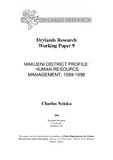| dc.description.abstract | This paper sets out the results of a survey conducted in four villages in Makueni
District, Kenya that was used to examine the nature of the family and its decision-
making, and to test hypotheses on the linkages between family investments in education
and its income-earning strategies and investments. The average size of the resident
family in the District is small, and is closely linked to two non-residents. The average
farm labour force in households surveyed was only 2 adults, typically middle aged or
elderly. Many adult children now working outside the homestead provide some
financial support to their original households. Education for the young is seen as an
investment priority and, for many households, it is more important now than 20 years
ago. Although households in Makueni District have incomes lower than the average
Kenyan income the numbers of primary and village polytechnic places in the zone has
risen over the last ten years. This has happened in spite of the fact that, apart from
teacher salaries, there is no longer any government financial support for these schools,
and the upkeep of schools falls to the local communities. Despite increasing worries
amongst many parents that their educated children will not find work, Makueni District
has some of the most impressive national examination records in Kenya, and secondary
education, which costs parents much more, is just maintaining recruitment levels, with
the proportion of girls enrolled rising. Involvement in self-help or
mwethya
groups is
widespread, but concentrated in the older age groups, as the young are at school or
away. Many groups are small and informal, and the funds derived from them are used
for a wide range of purposes, including consumption needs and investing in both
farming and non-farm businesses. The family is set to experience more change in the
future, since parents now aim for much smaller families than in the past, illustrated by
survey data which shows the size of families that young people and parents now prefer.
The changes in attitudes towards family size are attributed to the rising costs of living,
rather than to the impact of family planning programmes. | en |

